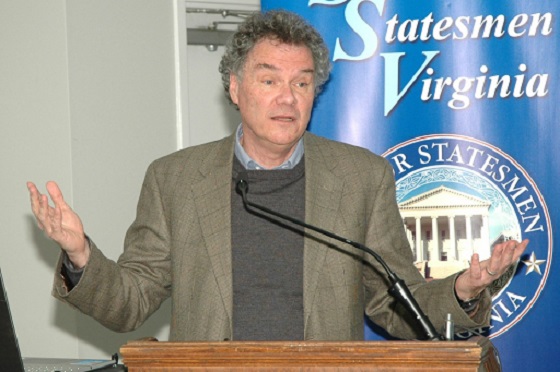Ending the Civil War: 1865 Until Today
Dr. Edward Ayers of the University of Richmond spoke to the Senior Statesmen of Virginia at its December 12, 2018 meeting. He stated that Americans continue to struggle with the causes and meanings of their Civil War. He discussed our current understanding of the war, why people disagree about it, and how we might move forward.

Dr. Ayers is Tucker-Boatwright Professor of the Humanities and president emeritus at the University of Richmond. He has been named National Professor of the Year, received the National Humanities Medal at the White House, served as president of the Organization of American Historians, and won the Bancroft Prize in American history. Ed is one of the cohosts for BackStory, a popular podcast about American history. His newest book, The Thin Light of Freedom: The Civil War and Emancipation in the Heart of America, received the Lincoln Prize.
Unfortunately the podcast of the meeting was corrupted and could not be recovered. A short video of the event can be found at the CBS19 link below.
Program Summary
Dr. Ayers discussed how myths about the “Lost Cause” limits our ability to fully recover from the Civil War. He used examples from his work with the Monument Avenue Commission in Richmond to illustrate the point that some are not yet willing to accept that a major cause of the Civil War was slavery. He pointed out that the Civil War lead to the end of perpetual bondage of 4 million people which is a major event in this country.
CBS19 News summarized the meeting with the following story:
It was a packed house at the Center on Wednesday (December 12, 2018) in Charlottesville where people gathered to talk about the Civil War.
The afternoon (December 12, 2018) gathering was sponsored by the Senior Statesman of Virginia and featured the former University of Richmond President and award-winning author Edward Ayers.
 He was talking about his newest book, “Thin Light of Freedom – The Civil War and Emancipation in the Heart of America.“
He was talking about his newest book, “Thin Light of Freedom – The Civil War and Emancipation in the Heart of America.“
Ayers says the “Lost Cause” myth of the Civil War has made it difficult to teach the reality of the reason why the Civil War was fought.
“It was created precisely to deny the centrality of slavery in the Civil War,” he said. “It was to ennoble peoples fathers and brothers who had died to create a new nation or as many think of it as dismantling the United States of America.”
Ayers also says if people understand all the reasons for the war including economics, they might better understand how slavery played a huge role as the economic engine of the country at the time.”
